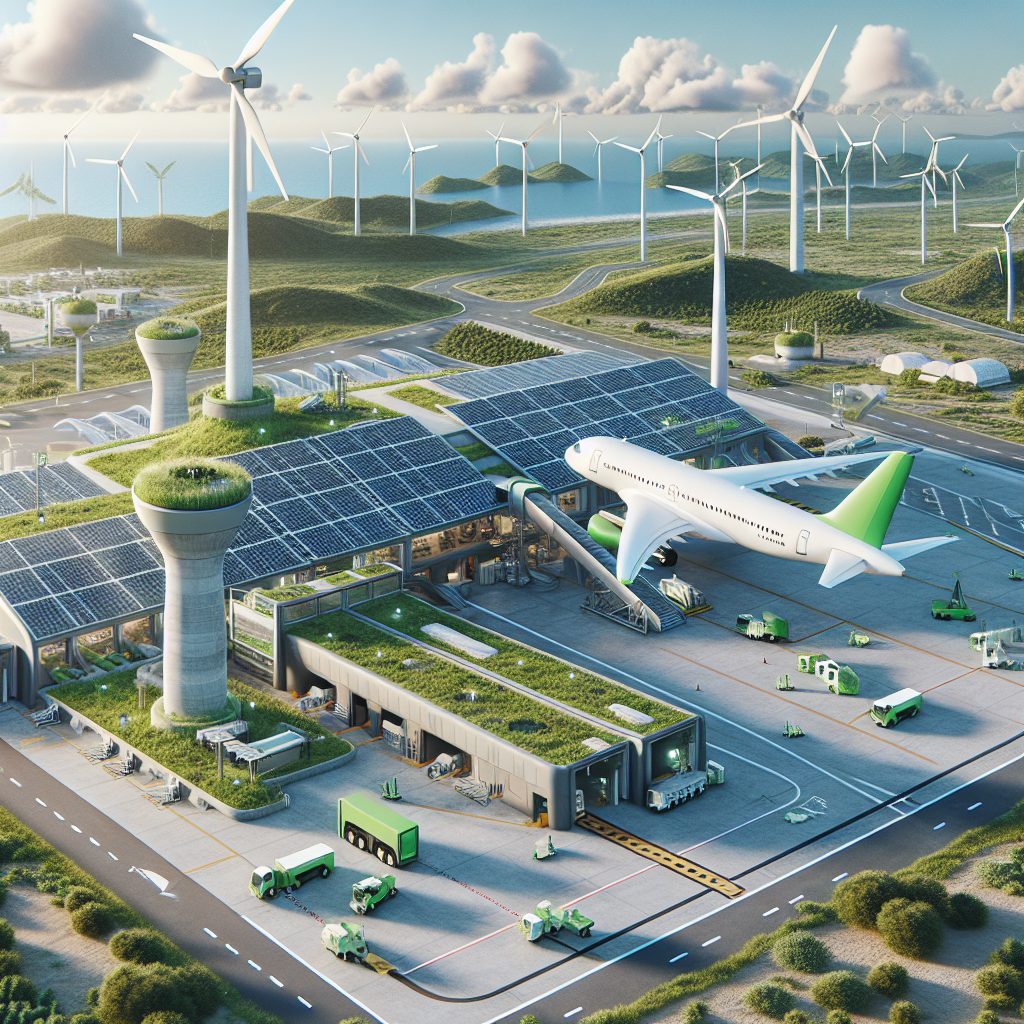
Sustainable air travel is a growing environmental issue that companies have to take into account in order for businesses to remain competitive in this era. Air travel is responsible for producing about two to three percent of global carbon dioxide emissions, making it a viable factor that needs to be addressed to help combat climate change. Airlines are already trying to lessen the environmental impact of their business in various ways such as investing in more efficient aircraft technologies, investing in renewable energy sources and encouraging customers to implement carbon offsets for their travels.
However, sustainable air travel cannot solely be achieved through technological advancements. Governments need to create incentives that would make more airlines reduce their emissions and adopt eco-friendly operations. Consumers can also decrease their air travel footprint by avoiding single-use plastics and reducing the number of flights they take through the use of video conferencing, additional public transport and so on. Going through the different risks and rewards associated with sustainable air travel is an important step towards improving our environment and ensuring an environmentally conscious world. In the coming parts of this article we will discuss the key takeaways, the benefits and cost associated with sustainable air travel as well as the practical measures companies and individuals can take to minimize the environmental impact of air travel.
Key Takeaways
1. Aviation accounts for 2-3% of global greenhouse gas emissions and is expected to grow exponentially due to the increase in population growth and increased air travel demand.
2. Sustainable air travel relies on the implementation of fuel-efficient aircrafts, alternative propulsion systems, and alternative fuel sources.
3. Aviation technology has evolved to reach efficiency targets in the form of fuel-efficient aircrafts, which use lighter materials and engines to reduce fuel burn rates dramatically.
4. Alternative propulsion systems, such as biofuels, electric flight, and hydrogen-powered engines, are also being explored to reduce aviation emissions.
5. Air traffic management also needs to be improved to reduce bottlenecks and delays, thus allowing for more efficient operations.
What are the Benefits of Sustainable Air Travel?
Technological Developments in Cleaner Aircraft Engines
The modern aircraft engine features a variety of features designed to increase fuel efficiency and reduce emissions. Cleaner burning, more efficient engines using advanced fuel injection, validated and optimized combustion techniques, and better fuel-air mixing. The latest generations of aircraft also utilize optimized jet intakes, which are designed to downplay drag, and reduce fuel consumption. Additionally, modern aircraft engines use fan blades made from strong, lightweight materials able to withstand higher pressure and speed than traditional metals.
Boeing and Airbus Efforts to Increase Fuel Efficiency
Leading aircraft manufacturers Boeing and Airbus have both taken steps to reduce fuel consumption and emissions from their planes. This includes the adoption of modernized engines known as ‘open rotor’ or ‘open blade’ designs which typically achieve 5.5%, or greater, fuel efficiency gains over traditional turbofan engines. Additionally, both companies have looked to architecture and design to reduce drag and weight; Boeing’s 787, for instance, is two and a half times more aerodynamically efficient than previous planes and made mostly from composite materials, which are lighter and stronger than traditional metals.
Sustainable Air Travel and Aviation Renewable Fuels
Aviation Renewable Fuels (ARF) can now be produced in various forms, such as hydrogen-based Jet A-1 alternative fuels or jet fuel derived from biomass, and can easily be adapted for commercial range jet aircraft engines, executing the same performance compared with traditional fuel. In addition to the obvious environmental and health benefits, these fuels are also economically feasible. According to Boeing, the cost of different types of alternative jet fuel derived from biomass could be 1-4% more expensive per gallon than traditional jet fuel, but are still cheaper than the cost of carbon offsets.
Air Traffic Management Reduces Emissions from Air Travel
In order to better manage traffic and reduce the potential environmental impact of air travel, aircraft are increasingly electing for Air Traffic Management (ATM). This involves the use of modernized technology and innovative procedures to improve the organization of air traffic flows, increasing web efficiency and reducing unnecessary fuel consumption and emissions. To this end, authorities and NATs (National Airspace Systems) have started to leverage the aviation sector’s internal analysis potential, using overflight save estimates and remaining fuel computations.
Integrating Sustainable Air Travel into Airline Operations
Sustainable air travel is imperative for the future of the industry, and airlines should begin integrating sustainable air travel practices into their operations. From ensuring that all aircraft are as fuel-efficient and optimized for drag reduction as possible, to adopting Air Traffic Management solutions, there are a number of cost-effective areas in which airlines can focus their efforts on reducing their environmental and carbon footprint. Additionally, airlines should leverage emerging Fuel Certified Sustainable Aviation Fuel solutions for use in their fleet.
Tips for Achieving Sustainable Air Travel
1. Invest in aircraft and engines that are designed for fuel efficiency and optimized for drag reduction.
2. Explore advantaged climb maneuvers to burn less fuel while climbing.
3. Make use of cutting-edge renewable fuels for aviation when possible.
4. Integrate Air Traffic Management solutions to improve efficiency and throughput.
5. Implement tracking systems to analyze the aircraft’s performance and compare to efficiency goals.
What are some sustainable air travel options?
There are several options for sustainable air travel, such as flying economy class or taking direct flights instead of connecting ones. Using public transportation such as trains or buses can also be beneficial. Purchasing carbon offset credits allows travelers to donate to renewable energy projects, which help reduce the emissions created by their flights.
What can travelers do to reduce air pollution?
In addition to choosing sustainable air travel options, travelers can reduce air pollution by researching the most efficient route before they book their flights. Carpooling or using ridesharing apps can help reduce the number of cars on the road. Additionally, travelers can reduce their carbon footprint further by taking shorter trips.
What measures are being taken by airlines to reduce their emissions?
Airlines are taking steps to reduce their emissions by investing in new, more efficient aircrafts, such as A350s, Boeing 787s and Airbus A319neos. They are also investing in carbon offsetting, sustainable fuels and more efficient flight paths. Some airlines are even looking into electric aircrafts for the future.
What are the benefits of sustainable air travel?
Sustainable air travel is beneficial for people, the environment and businesses. It helps reduce CO2 emissions and preserve resources, leading to healthier air quality. It also reduces noise pollution, which helps improve quality of life in cities and near airports. Sustainable air travel also saves businesses money by reducing fuel costs.
What do travel companies need to do to be more sustainable?
Travel companies need to have a clear sustainability policy in place that outlines the steps they are taking to reduce their emissions and improve their sustainability efforts. This includes training their staff on sustainable air travel and investing in new technologies such as electric airplanes and more efficient flight paths. Companies also need to ensure their suppliers are also following sustainable practices.
Are electric airplanes a viable option?
Yes, electric airplanes are a viable option for sustainable air travel. Airlines around the world are researching and developing electric airplanes as an alternative to traditional aircrafts. These electric airplanes are powered by batteries and have the potential to reduce emissions drastically if they become widely available.
How can we encourage people to choose sustainable air travel?
Encouraging people to choose sustainable air travel starts with raising awareness of the environmental impacts of air travel. By making people aware of the damage they are doing when they fly, they will be more likely to make sustainable choices. Travel companies and governments can also provide incentives for sustainable travel, such as discounts or carbon offsets.
Is flying economy class considered sustainable?
Yes, flying economy class is considered a sustainable option because it usually means flying direct and using less fuel, which reduces emissions. Additionally, flying first class or business class often means more passengers have to share the same amount of space, leading to more emissions.
What other steps can travelers take to reduce their carbon footprint when flying?
Travelers can reduce their carbon footprint by packing light and using digital boarding passes instead of paper ones. They can also bring their own snacks and choose flights with fewer stops, as these will usually use less fuel. Additionally, travelers should minimize their use of air conditioning and minimize the need for hotel rooms by using sites such as couchsurfing or Airbnbs.
Does sustainable air travel cost more?
No, sustainable air travel does not necessarily have to cost more. Flying economy class or taking direct flights instead of connecting ones are usually cheaper options, while offsetting costs can be managed for a reasonable amount of money. Travelers can usually find discounts on more sustainable options, making them more affordable.
Final Thought
Sustainable air travel is becoming increasingly possible as airlines invest in new technologies and travelers become more conscious of their environmental impact. By doing research before they book their tickets, travelers can take steps to reduce their carbon footprint without having to spend more money.
The future of air travel looks increasingly sustainable, and travelers have a role to play in this. By making informed decisions and investing time and money into more sustainable options, we can all do our part to reduce emissions and make air travel greener and more eco-friendly.



